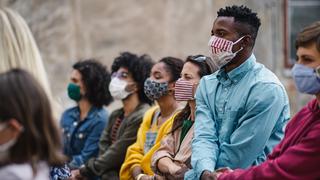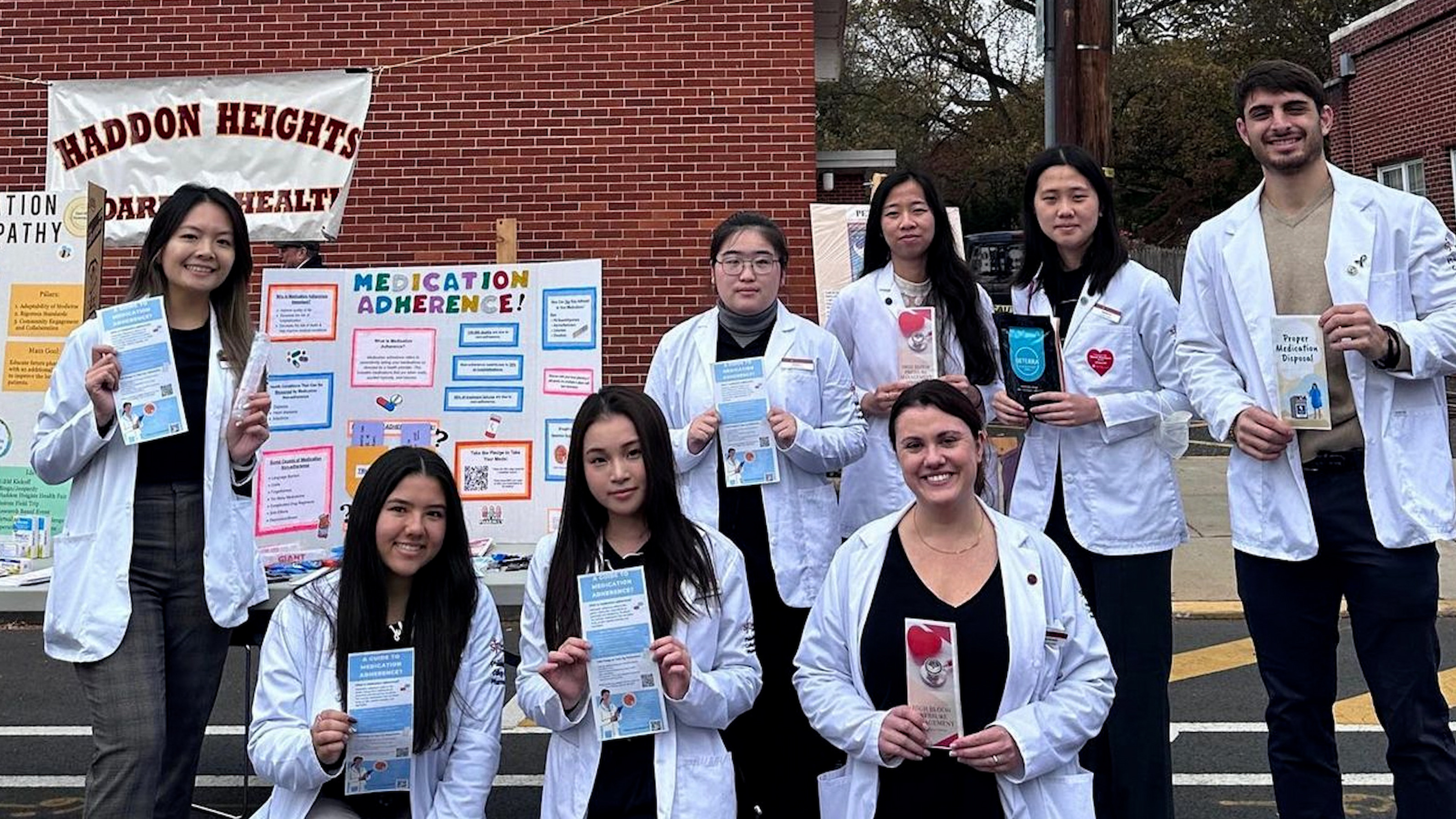Summer Scholars’ Projects Focus on Diversity, Equity and Inclusion
Influenced by the civil unrest of the past year, students in the Summer Scholars program are researching topics ranging from Black Lives Matter in Greek life organizations to how female politicians are portrayed in the media.
 Sociology major Stephanie Zellner ’22 is researching whether Greek life organizations' response to the unrest of 2020 was merely performative or in fact a renewed commitment to DEI.
Sociology major Stephanie Zellner ’22 is researching whether Greek life organizations' response to the unrest of 2020 was merely performative or in fact a renewed commitment to DEI.
Since 1994, students at Saint Joseph’s University have had the opportunity to participate in faculty-mentored research through the University’s Summer Scholars Program. The aim of the program is to provide students the chance to engage in research or other creative activities full time, while fostering professional relationships with their faculty mentors.
This year, over 60 students are participating in the program with topics ranging from COVID-19 to fair trade and the Supreme Court Justices.
“The program gives students a tangible way of connecting what they’re learning in the classroom to practical applications in the field or in their social life,” says Nicole Stokes, Ph.D., associate provost for diversity, equity and inclusion and the faculty mentor to Stephanie Zellner ’22.
Zellner is one of three Summer Scholars whose research project focuses on diversity, equity and inclusion – a topic that was inspired by 2020’s wave of civil unrest.
Greek Life Organizations and Diversity, Equity and Inclusion
A sociology major, Zellner is working on a project called “The Culture of Diversity Equity and Inclusion in the Largest Greek Life Organizations and their Responses to 2020.” As a member of the Alpha Phi Omega fraternity and director of diversity, equity and inclusion for Alpha Omicron Pi, she was inspired to connect her extracurricular activities with her academic interests.
“A lot of jargon was being thrown around with Black Lives Matter, and a lot of it seemed very performative, like the black squares on Instagram,” she says, referring to Blackout Tuesday, where many Instagram users posted black squares with captions expressing solidarity with Black Lives Matter.
Zellner wanted to see if Greek life organizations’ responses to Black Lives Matter and the events of 2020 — such as financial struggles caused by the COVID-19 pandemic — were just reactive in the moment, or whether it signaled a continued commitment to diversity, equity and inclusion.
Her research will focus on the top 10 most popular fraternities and sororities that are predominantly Caucasian-presenting or founded by Caucasian members. She’s conducting a content analysis on their mission statements, which also includes looking at their websites, public posts and social media platforms to see what statements they are putting out and the language they are using under the umbrella of diversity, equity and inclusion.
“I’m already learning so much about the different mission statements,” Zellner says. “Especially from the sororities. I’ve learned that headquarters typically have a brand they like to stick to, and sometimes that brand doesn’t always include marginalized voices, even though individual members of a Greek organization may be the most committed to DEI. So the next step would be figuring out how to bridge that gap.”
The Language of Gender and Politics
Devin Yingling ’22 is analyzing the journalism and news coverage that surrounded the 2020 U.S. presidential election. Her project, “Exploring Gendered Language in News Coverage of Women Political Leaders in the U.S.”, will look at how female politicians are described and portrayed in the media. Lisa Baglione, Ph.D., professor of political science, is her faculty mentor.
“News organizations have become more enlightened – or we perceive them to be more enlightened – and so they may avoid the old, really strong stereotypes,” says Baglione. “Some folks might think [stereotypes] don’t exist anymore.”
That’s what Yingling, a political science major, is hoping to uncover.
She’s examining the language used by newspapers during the week leading up to and the week immediately following the first three 2020 Democratic primary debates. Yingling plans to identify traits reporters use to characterize women, men and people of color, and then analyze the coverage to see if and how the ideological orientations of news organizations affect the portrayals.
Her first cases compare the reporting on Senators Cory Booker and (now vice president) Kamala Harris, allowing her to focus on race and its intersection with gender. In a second round, she will study the coverage of Senator Elizabeth Warren and Bernie Sanders to discern if gender biases exist when newspapers report on two white candidates.
If neutrality to gender and race prevails, Yingling won’t see differences in the language used across news outlets and candidates. Experts, however, expect her to find variations.
Recently promoted to editor in chief of The Hawk student newspaper, Yingling recognizes the power of words.
“The political field is white-male dominated,” she says. “So it’s really important to understand whether or not we are making progress [in the field of journalism] and if not, how we can. The language we use is important for everything. I think understanding how language plays a role in which people come to power is extremely important.”
Understanding how language plays a role in which people come to power is extremely important.
Devin Yingling ’22
Sociology MajorAt the end of her research, Yingling will submit her final paper to the Northeast Political Science Association annual conference and present it in November 2021.
An Oral History of Transitioning Adolescents
Stephanie Wengler’s ’23 idea for her Summer Scholars project came after a heated debate about the election in her news reporting class.
“I spoke out and said I voted in favor of my friend’s little sister, who is transgender and can’t vote because she’s only 14 years old,” explains Wengler. “I saw her go through the entire process of transitioning … how she changed her social media, how she interacted with people and the length of her hair.”
Wengler was also affected by the hate speech she saw directed toward the LGBTQIA community online and decided to create an oral history project surrounding stories of adolescents and their transition between genders.
“There are a number of LGBTQ oral history archives, and a smaller subset of specifically trans oral history archives,” says Rachael Sullivan, Ph.D., assistant professor in communications and media studies and Wengler’s faculty mentor. “But none of them focus on adolescents transitioning.”
Wengler plans to interview her friend’s little sister, who transitioned at age 12, in the hopes that it will help other adolescents who are transitioning with topics like bullying at school, talking to parents and seeking out medical needs.
Knowing this topic can be sensitive, Sullivan is making sure Wengler approaches the interview thoughtfully.
“I told her it’s really important that she think critically about her methodology and make sure she’s approaching that ethically,” says Sullivan.
Wengler is still preparing for the interview, but has already learned a lot about how to properly conduct an interview by researching other oral histories.
“I feel prepared, but I had no idea how much work went into something like this,” she admits.
She hopes to make her research publicly available so people can see and understand the journey of transitioning.
“Ideally, I want this to be an example for other people, older and younger,” Wengler says, “that there’s no age when you’re supposed to start expressing yourself.”
Read more about our 2021 Summer Scholars:
- History Major Investigates the Convenience of Conspiracy Throughout the Pandemic
- Lenora Thomas ’23 Uses Poetry to Express Outcomes of Pandemic Isolation
- Student Examines Cognitive Consequences of Long COVID-19
- SJU Summer Scholars Aim to Forge New Pathways in Education



